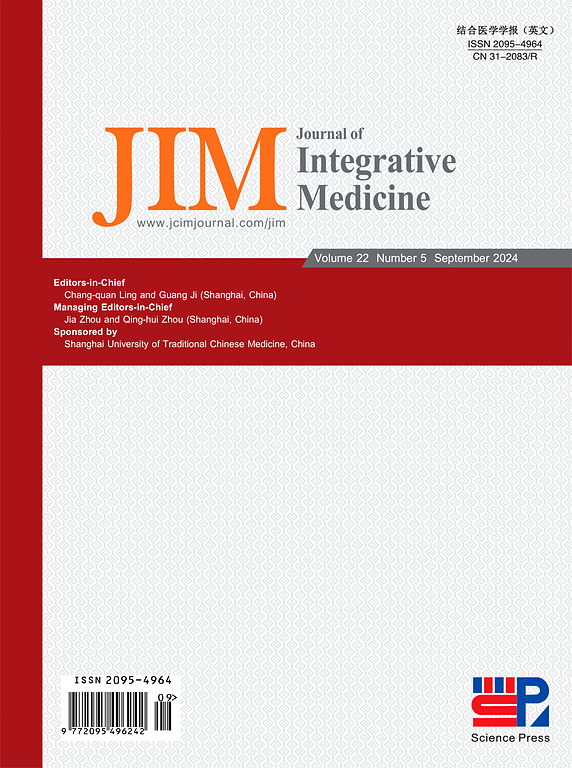针灸通过调节小鼠肠道微生物群依赖性肠道屏障功能改善特应性皮炎
IF 4
2区 医学
Q1 INTEGRATIVE & COMPLEMENTARY MEDICINE
引用次数: 0
摘要
目的 特应性皮炎(AD)是一种慢性炎症性皮肤病,可能与肠道微生物组的变化有关。针灸已被证实能有效减轻 AD 症状,且无严重不良反应,但其潜在机制尚不完全清楚。本研究旨在探讨针灸对AD的潜在作用是否依赖于肠道微生物群。方法在小鼠脸颊局部涂抹MC903,诱发AD样皮损。针刺小鼠的谷椎(LI11)穴。AD样症状通过皮损评分、搔抓行为和组织病理学变化进行评估;肠道屏障功能通过粪便排出量、血清脂多糖水平、组织病理学变化以及肠道通透性和炎症相关标记物的mRNA表达进行测量。结果 针灸有效地改善了慢性瘙痒以及表皮增厚的 AD 样皮损,并通过 β 多样性指数和相似性分析显著改变了肠道微生物群结构。抗生素耗尽肠道微生物群后,这些有益作用被消除,但在接受了针灸治疗小鼠粪便微生物群移植的肠道微生物群耗尽小鼠中,这些有益作用得以重现。有趣的是,AD 小鼠肠道屏障功能失调,表现为肠道通透性增加、粘膜结构萎缩(绒毛高度和隐窝深度降低)、紧密连接和粘液合成基因表达减少以及回肠炎症介质表达增加。结论 针灸以肠道微生物群依赖性的方式改善了AD样表型,其中一些积极益处可通过调节肠道屏障来解释,这为调节肠道微生物群预防和治疗AD的非药物策略提供了新的视角:Yeom M, Ahn S, Hahm DH, Jang SY, Jang SH, Park SY, Jang JH, Park J, Oh JY, Lee IS, Kim K, Kwon SK, Park HJ.针灸通过调节小鼠肠道微生物群依赖性肠道屏障功能改善特应性皮炎。J Integr Med.2024; 22(5):600-613.本文章由计算机程序翻译,如有差异,请以英文原文为准。
Acupuncture ameliorates atopic dermatitis by modulating gut barrier function in a gut microbiota-dependent manner in mice
Objective
Atopic dermatitis (AD) is a chronic inflammatory skin disease that may be linked to changes in the gut microbiome. Acupuncture has been proven to be effective in reducing AD symptoms without serious adverse events, but its underlying mechanism is not completely understood. The purpose of this study was to investigate whether the potential effect of acupuncture on AD is gut microbiota-dependent.
Methods
AD-like skin lesions were induced by applying MC903 topically to the cheek of the mouse. Acupuncture was done at the Gok-Ji (LI11) acupoints. AD-like symptoms were assessed by lesion scores, scratching behavior, and histopathological changes; intestinal barrier function was measured by fecal output, serum lipopolysaccharide levels, histopathological changes, and mRNA expression of markers involved in intestinal permeability and inflammation. Gut microbiota was profiled using 16S rRNA gene sequencing from fecal samples.
Results
Acupuncture effectively improved chronic itch as well as the AD-like skin lesions with epidermal thickening, and also significantly altered gut microbiota structure as revealed by β-diversity indices and analysis of similarities. These beneficial effects were eliminated by antibiotic depletion of gut microbiota, but were reproduced in gut microbiota-depleted mice that received a fecal microbiota transplant from acupuncture-treated mice. Interestingly, AD mice had intestinal barrier dysfunction as indicated by increased intestinal permeability, atrophy of the mucosal structure (reduced villus height and crypt depth), decreased expression of tight junctions and mucus synthesis genes, and increased expression of inflammatory mediators in the ileum. Acupuncture attenuated these abnormalities, which was gut microbiota-dependent.
Conclusion
Acupuncture ameliorates AD-like phenotypes in a gut microbiota-dependent manner and some of these positive benefits are explained by modulation of the intestinal barrier, providing new perspective for non-pharmacological strategies for modulating gut microbiota to prevent and treat AD.
Please cite this article as: Yeom M, Ahn S, Hahm DH, Jang SY, Jang SH, Park SY, Jang JH, Park J, Oh JY, Lee IS, Kim K, Kwon SK, Park HJ. Acupuncture ameliorates atopic dermatitis by modulating gut barrier function in a gut microbiota-dependent manner in mice. J Integr Med. 2024; 22(5): 600–613.
求助全文
通过发布文献求助,成功后即可免费获取论文全文。
去求助
来源期刊

Journal of Integrative Medicine-Jim
Medicine-Complementary and Alternative Medicine
CiteScore
9.20
自引率
4.20%
发文量
3319
期刊介绍:
The predecessor of JIM is the Journal of Chinese Integrative Medicine (Zhong Xi Yi Jie He Xue Bao). With this new, English-language publication, we are committed to make JIM an international platform for publishing high-quality papers on complementary and alternative medicine (CAM) and an open forum in which the different professions and international scholarly communities can exchange views, share research and their clinical experience, discuss CAM education, and confer about issues and problems in our various disciplines and in CAM as a whole in order to promote integrative medicine.
JIM is indexed/abstracted in: MEDLINE/PubMed, ScienceDirect, Emerging Sources Citation Index (ESCI), Scopus, Embase, Chemical Abstracts (CA), CAB Abstracts, EBSCO, WPRIM, JST China, Chinese Science Citation Database (CSCD), and China National Knowledge Infrastructure (CNKI).
JIM Editorial Office uses ThomsonReuters ScholarOne Manuscripts as submitting and review system (submission link: http://mc03.manuscriptcentral.com/jcim-en).
JIM is published bimonthly. Manuscripts submitted to JIM should be written in English. Article types include but are not limited to randomized controlled and pragmatic trials, translational and patient-centered effectiveness outcome studies, case series and reports, clinical trial protocols, preclinical and basic science studies, systematic reviews and meta-analyses, papers on methodology and CAM history or education, conference proceedings, editorials, commentaries, short communications, book reviews, and letters to the editor.
Our purpose is to publish a prestigious international journal for studies in integrative medicine. To achieve this aim, we seek to publish high-quality papers on any aspects of integrative medicine, such as acupuncture and traditional Chinese medicine, Ayurveda medicine, herbal medicine, homeopathy, nutrition, chiropractic, mind-body medicine, taichi, qigong, meditation, and any other modalities of CAM; our commitment to international scope ensures that research and progress from all regions of the world are widely covered. These ensure that articles published in JIM have the maximum exposure to the international scholarly community.
JIM can help its authors let their papers reach the widest possible range of readers, and let all those who share an interest in their research field be concerned with their study.
 求助内容:
求助内容: 应助结果提醒方式:
应助结果提醒方式:


